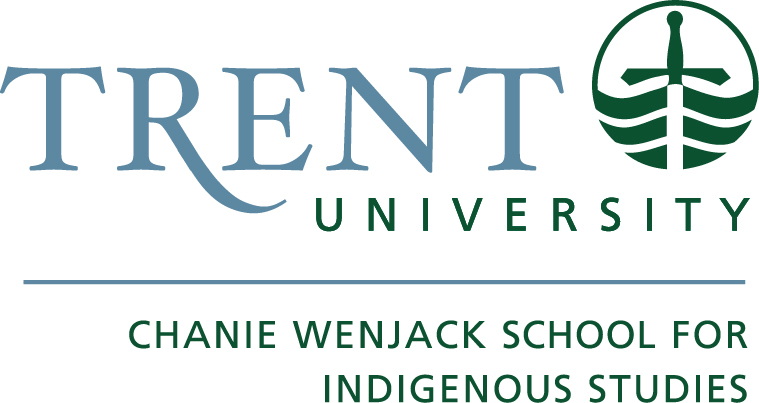Learn from exceptional faculty with backgrounds in both Western and Indigenous knowledge, and experience cross-cultural learning. Learn how Indigenous peoples in Canada and around the world are shaping our globe through a creative blend of Indigenous and Western knowledge. You will study the historical and contemporary interactions between Indigenous and non-Indigenous societies, and the cultural foundations of Indigenous life in areas such as performance, literature, politics, ecology, and governance.
*Please note that this page is under construction.
Full Time Faculty
Nicole Bell | Associate Professor
Nicole is currently an Associate Professor at the School of Education. Her research areas include: Indigenous culture-based education, infusion of Indigenous knowledge into public schooling and teacher education, decolonization and healing, and Indigenous research theory and methodology.
Nicole is Anishnaabe (Bear Clan) from Kitigan Zibi First Nation in Quebec. She is the mother of five boys and is passionate about Indigenous education, motivated by her educational experiences personally and as a mother.
Jenn Cole | Assistant Professor
Jenn Cole is mixed-ancestry Algonquin Anishinaabe from Kiji Sibi watershed territory. She is Assistant Professor of Indigenous Performance and Gender in The Chanie Wenjack School for Indigenous Studies and Gender and Social Justice. She is Artistic Director for Nozhem First Peoples Performance Space. She is also editor for Canadian Theatre Review Views and Reviews, a mother, and a performer.
Jenn researches Indigenous Performance as it intersects with cultural continuance; Indigenous joy; settler/Indigenous relations; and reciprocal relationship to the Land, especially at the site of the Kiji Sibi/Ottawa River.
Mark Dockstator | Associate Professor
My primary interest lies in the practical application of Indigenous knowledge to the contemporary situation of Indigenous Peoples. For example, how do you incorporate aspects of Indigenous knowledge into self government...health care...economic development…land claims? The practical, day to day use and incorporation of Indigenous Knowledge into the lives of Indigenous Peoples is not only a need...but also represents the very heart of the continuing existence of Indigenous people as Indigenous Peoples.
Kevin Fitzmaurice | Associate Professor
As an ally scholar, Dr. Kevin Fitzmaurice is a Co-Investigator and National Steering Committee Member with the 'A Safe and Affordable Place to Call Home: A Multi-disciplinary Longitudinal Outcomes Analysis of the National Housing Strategy' and an Ontario Regional Co-Director with the 'Urban Aboriginal Knowledge Network (UAKN). He is also a Co-Investigator with the 'Making the Shift: Youth Homelessness Innovation Lab (Sudbury/Timmins)' and the 'Maamwizing Indigenous Research Institute / Race Gender Diversity Initiative'.
His areas of teaching and research specialization include Urban Indigenous Studies, Housing and Homelessness, Indigenous-Settler Politics and Law, Indigenous Critical Theory, and Indigenous Research Methods.
Classes: INDG 1002H, INDG 3201H and INDG 3202H, INDG 4201H
Chris Furgal | Department Co-Chair and Associate Professor
My research interests are in the fields of environmental health risk assessment, management and communication in cooperation with Indigenous populations. A particular focus of the work is on communities living in rapidly changing natural environments such as coastal and Arctic ecosystems.
Classes: INDG-ERST 3730Y; 4740Y
Jack Hoggarth | Chair of Anishinaabe Knowledge and Assistant Professor
Jack is the Chair of Anishinaabe Knowledge, as well as an Assistant Professor of Michi Saagiig Culture & Knowledge within the Chanie Wenjack School for Indigenous Studies. He pursued his academic education at Trent University, the University of Northern British Columbia, and Western University. In addition to his academic background, Jack continues to learn his traditional Anishinaabeg education, in which, he is a member of the Minweyweywigaan Midewiganing. His home communities are Kawartha Nishnawbe First Nation, Curve Lake First Nation, Teet'it Zhen (NT), and Old Crow First Nation (YT).
Dan Longboat | Associate Professor
My research interests are diverse and cover topics including Indigenous environmental Knowledges and philosophy, Indigenous responses to environmental issues, interactive science and Indigenous Knowledge systems, Indigenous education, pedagogy and Indigenous ways of knowing as founded upon Indigenous languages and cultures, the recognition and resurgence of Traditional Indigenous lifeways and practices, human health and the environment, Traditional Indigenous foods and medicines, natural resource development and restoration, community sustainability, international Indigenous networks, the recognition of Treaty and Indigenous rights and understandings of the environmental and human impacts of colonialism.
dlongboat@trentu.ca Dr. Longboat is on sabbatical for the 2025-2026 academic year.
Classes: INDG-ERST 2601Y; INDG-ERST 3634H; INDG-ERST 4730Y
Elizabeth Osawamick | Assistant Professor
As an Anishinaabe-kwe (Indigenous woman), Liz Osawamick's pedagogy is informed by her cultural practices; thus, as a fluent Anishinaabemowin (Ojibwe/Odawa Language) speaker, teaching Anishinaabemowin, the Ojibwe language, is her life practice. She sees language as a foundation that is required to retain, revitalize, and regenerate the Anishinaabe traditions, culture, and history of which she is an active practitioner. She also sees language acquisition as a bridge to reconciliation for non-Indigenous students, paving the way for a future of better relationships between Anishinaabeg and non-Indigenous peoples. She utilizes an active Anishinaabeg method of teaching and learning through song, dance, and other culturally based activities and practices.
She will work with students whose research fields encompass:
Anishinaabe language, knowledge, and culture, as well as with students in other areas of study. In supporting a deeper understanding of the land, history, and experiences of Indigenous people in every sector of Canadian culture and society, her work has relevance and impact across all disciplines and in every field or study.
Jackson Pind | Assistant Professor
Jackson is an Assistant Professor of Indigenous Methodologies in the Chanie Wenjack School of Indigenous Studies at Trent University in Peterborough, Ontario. He was formerly the inaugural Postdoctoral Fellow in Indigenous Education at the Faculty of Education, Queen's University. He finished his doctorate in education during the Fall of 2021 with a focus on the history of Indian Day Schools in Ontario in partnership with Curve Lake First Nation which was awarded the 2022 Canadian History of Education Dissertation Prize.
Areas of Supervision: Anishinaabeg history, Indigenous education, Indigenous-settler relations, Counter-mapping/Digital historical mapping, and Climate change history.
Robin Quantick | Assistant Professor
My research interests fall into two areas:
Justice Issues: Prisons and prison education with particular emphasis on the disproportionate representation of incarcerated Indigenous men and women in Canada. The focus of this work is on Elders and their role in contributing to successtul community reintegration for incarcerated Indigenous men and women.
Decolonizing Curriculum Design: I am interested in the challenges of Indigenization in the academy and in the community. I am particularly interested in research that explores the application of Indigenous Knowledge and Universal Design for Learning in the design and delivery of decolonizing courses of study.
Paula Sherman, Department Co-Chair and Associate Professor
My work is focused primarily in the area of Indigenous histories and Indigenous women. My focus has been on restoring Indigenous autonomy through historical research that is grounded in Indigenous methodologies and encompassing methods such as Indigenous performance, language, land based knowledge, orality, and archival or documentary sources. I will accept students who are working in the area of Indigenous history, women, or other related fields.
Skahendowaneh Swamp | Associate Professor & Chair of Indigenous Knowledge, Wolf Clan Faith Keeper
I am actively involved in my home community of Akwesasne as a language teacher and Faith Keeper. My research focus is on Haudenosaunee traditional knowledge.
skahendowanehswamp@trentu.ca Professor Swamp is on sabbatical for the 2025-2026 academic year.
Classes: INDG 2100Y; INDG 3180H; 4180H; INDG 4150Y Summer; INDG 6600Y
Barbara Moktthewenkwe Wall | Director of Studies PhD Program and Associate Professor
Barbara Moktthewenkwe Wall is an enrolled member of the Citizen Potawatomi Nation in Shawnee, Oklahoma. She is a Dual-Tradition scholar of mixed ancestry. Barbara teaches in the Indigenous Environmental Studies/Sciences and Indigenous Studies PhD programs.
Her research is primarily based in the Great Lakes Basin and focuses on Anishinaabe Knowledges and foodways - reclamation and revitalization, and their application at the interface with euro-centric
barbarawallphd.com
Part-Time Faculty
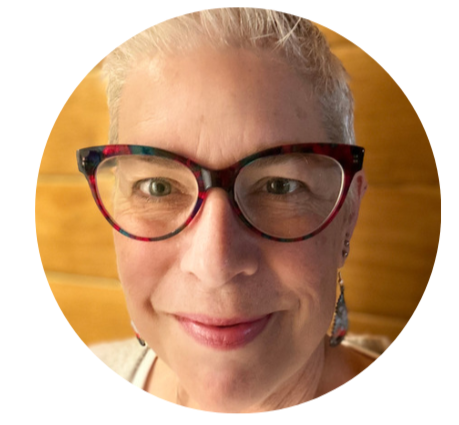 Joeann Argue
Joeann Argue
Assistant Professor | jargue@trentu.ca
B.A., Guelph; B.A. Trent; MFA Vermont College of Fine Arts
Joeann joined the Faculty of the Wenjack School for Indigenous Studies in 2012.
Joeann has a deep understanding of the process of Traditional teaching and learning. She has carried many bundles during her time at Trent, providing the services of Indigenous Counsellor, Director of the First Peoples House of Learning and as Theatre Coordinator and Instructor over the past two decades. A member of Unity, the well know Traditional Women's singing group, Joeann has lent her voice in many capacities to the sounds of Spirit as their voices enter the various events for which they are asked to sing.
Joeann's research interests are in all aspects of storytelling, performance, and Indigenous philosophical concepts of time and space.

Phil Abbott | pabbott@trentu.ca
Research and Teaching Interests: Settler Colonialism and Resistance, Treaty History, History Education, Historical Consciousness, Impacts of 19th century European settlement.
Classes: INDG 1001H, INDG 1002H
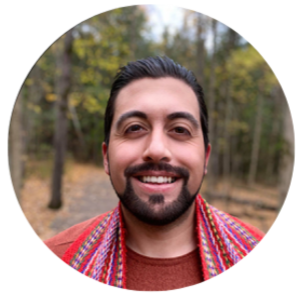 Mitchell Huguenin
Mitchell Huguenin
Education Developer, Indigenous Pedagogy with Centre for Teaching & Learning
Instructor, Chanie Wenjack School for Indigenous Studies and School of Education | mhuguenin@trentu.ca
Hailing from Penetanguishene, Mitchell is a registered citizen of the Métis Nation of Ontario (MNO), a Métis rights-holder from the historic Georgian Bay Métis community, and a proud descendant of the Drummond Island Métis with ancestral ties to the North-West Company at Red River. Mitchell developed the first Indigenous-centric courses offered at Durham College. With his leadership, Durham developed an Indigenous course requirement in 2021 for all Health and Community Services (HCS) students. He is currently a part-time instructor with Trent University’s Chanie Wenjack School for Indigenous Studies and in its School of Education. Mitchell is also the inaugural Education Developer for Indigenous Pedagogy in Trent’s Centre for Teaching and Learning.
Research interests:
- Indigenous education and pedagogy
- Curriculum design in higher education
- Metis history in Ontario
- Metis culture, identity, and self-government
- Indigenous health and physical activity
Classes: INDG 2560H
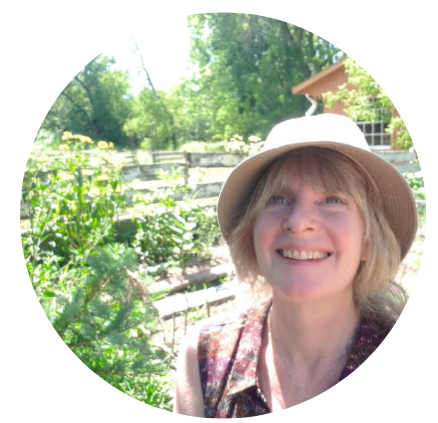 Jane Gray | jagray@trentu.ca
Jane Gray | jagray@trentu.ca
Assistant Professor
Jane spent 16 years in sustainability policy work including as a senior analyst for the Cabinet Policy Secretariat in Manitoba, an Executive Director for Manitoba’s Climate and Green Initiative Branch and as a Director for International NGO, The Climate Group, working with sub-national governments and businesses from around the world. Her work has included co-creating traditional land planning protocols with First Nations communities and policies and programs to help protect climate, water and land and to promote green economic development. She has also worked on policies and programs to promote healthy early childhood development. Since coming to Michi Saagiig territory she received her MA in Sustainability Studies and completed her PhD in the Chanie Wenjack School of Indigenous Studies focusing on the intersections between governance, sustainability and Indigenous Knowledges and ways to transform senior level policy processes to put the natural world at the foundation of decision-making.
She has been designing and teaching sustainability courses at the post-secondary level for the last 12 years and currently teaches in Indigenous Environmental Studies and Sciences and in the School of Business at Trent University. She is a non-indigenous person, deeply grateful for the opportunity to live, work and be part of the community on beautiful Michi Saagiig territory.
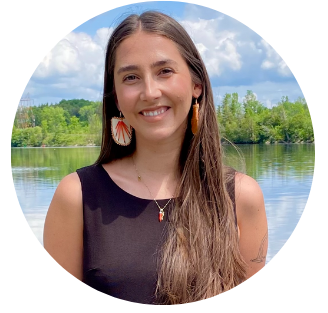 Heléna Mauti | hmauti@trentu.ca
Heléna Mauti | hmauti@trentu.ca
B.A. (University of Toronto), M.A. (Trent University)
Heléna Mauti is a settler with Indigenous ancestry. She is the granddaughter of Italian immigrants from the Liri River watershed, Scottish settlers of the Matheson Clan from the Isle of Lewis, German-Austrian settlers, and Anishinaabe grandmothers from Rice Lake. She currently lives in Mono, Ontario, what is lovingly referred to as the 'Headwaters' of the Grand, the Humber, the Credit and the Nottawasaga Rivers. Her responsibilities lie to the People and Beings of the places her, and her ancestors have always lived on Anishinaabe Akiing. In addition to teaching in the IESS program, Heléna creates land-based programs braiding Indigenous Knowledges and STEM out of the University of Toronto's Engineering Outreach Office.
Research interests: Indigenous-Led Conservation and Land Back; Resurgence of Anishinaabe Ways of Knowing, Being, and Doing; anti-colonial Spirit-led methodologies; Indigenous land-based pedagogies
Classes: IESS 1001H
Heather Shpuniarsky | hshpuniarsky@trentu.ca
Classes: INDG 1001H, INDG 2030H, INDG 2001H & 2002H
David King | davidking@trentu.ca
Classes: INDG 2001H & 2002H, INDG 3745H, INDG 3750H
Kelly Harrison | kellyharrison@trentu.ca
Classes: INDG 3102Y Summer
James Wilkes | jwilkes@trentu.ca
Classes: INDG-IESS 3631H and 3632H
Emeritus & Retired Faculty
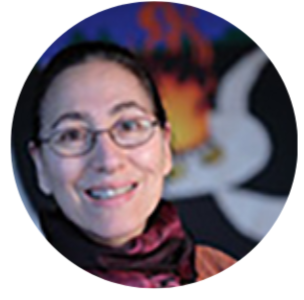 Lynne Davis
Lynne Davis
Professor Emeritus | lydavis@trentu.ca
B.A. (Queen’s), M.A. (Sussex), M.A. (Alberta), Ph.D. (Toronto)
Research Interests: Lynne’s areas of specialization are Aboriginal community development, building sustainable communities, social change, international development, popular education, and Aboriginal alliances with social movements.
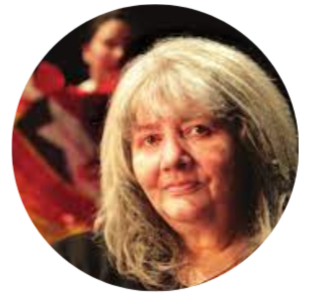 Marrie Mumford (Métis)
Marrie Mumford (Métis)
Professor Emeritus | marriemumford@trentu.ca
Research Interests: Indigenous theatre, arts and dance
David Newhouse
Professor Emeritus | dnewhouse@trentu.ca
David Newhouse is Onondaga from the Six Nations of the Grand River community near Brantford, Ontario. Prior to retiring in 2025, he served as the first Director of the Chanie Wenjack School from 1994 until 2023 and held leadership roles like Co-Chair of the Trent Indigenous Education Council (2001–2022) and member of the Frost Centre's Executive Committee (2000–2022). David was a Professor of Indigenous Studies at Trent University in the Chanie Wenjack School for Indigenous Studies and Professor of Business Administration in the School of Business Administration. His research interests focus on the emergence of modern Indigenous society.
David has received many awards recognizing his exceptional leadership and service throughout his career, including the Award for Educational Leadership and Innovation (2016), the 3M Teaching Fellow (2022), the Jackie Muldoon Award (2023), and the Trent Eminent Service Award (2025). In 2024, he received the Lee Lorch Award from the Canadian Association for University Teachers (CAUT) for his contributions to supporting academic labour rights and to intellectual engagement among students, colleagues, and the public. He was also awarded the Trent University Teaching Award for Educational Leadership and Innovation in 2016.
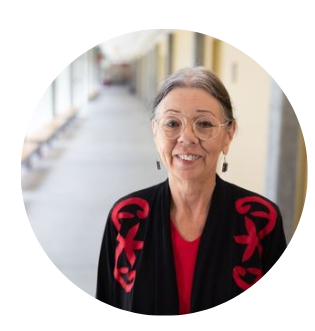 Michele Lacombe
Michele Lacombe
Professor Emeritus | mlacombe@trentu.ca
Dr. Michele Lacombe (B.A. McGill, M.A. and PhD York) is Professor Emeritus, cross appointed to Indigenous Studies (her home department) and Canadian Studies. Prior to retirement her teaching included graduate and undergraduate courses on Indigenous research methodologies, Indigenous literatures, women’s writing, gender and women’s studies, and critical theory. Of mixed-ancestry Maliseet and French culture, she is first degree Midewiwin in the Minweyweyigaan Lodge. Her current research project focusses on crosscurrents in creative writing from Maine and New Brunswick, the subject of a Fulbright Fellowship in American Indian Studies at the University of Arizona in 2023. She is interested in the relationship between Indigenous literatures and Indigenous knowledges in both 19th century colonial and contemporary contexts.
Professor Lacombe’s most recent publication is “Rogarou Genealogies in Cherie Dimaline’s Empire of Wild” in Studies in American Literatures 34: 3-4 (Fall-Winter 2022), 102-123. Selected earlier work includes articles and book chapters about Leanne Betasamosake Simpson (in Canadian Literature), Wabanaki poetry (in Studies in Canadian Literature), Innu poetry (in Indigenous Poetics in Canada), francophone Indigenous literatures (in Studies in Canadian Literature), Eden Robinson (in International Journal of Canadian Studies), and Acadian writer Antonine Maillet (Canadian Literature and Open Letter).
Don McCaskill | dmccaskill@trentu.ca


